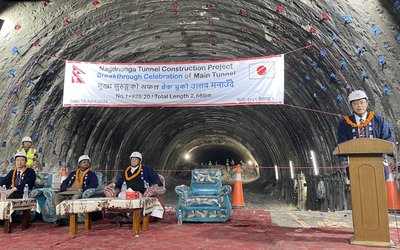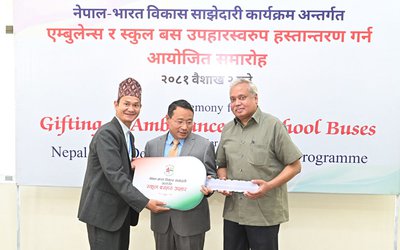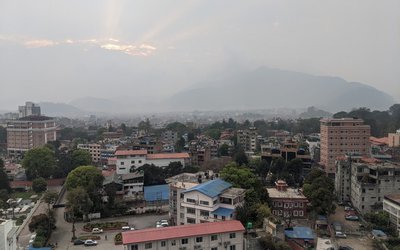With the decision to continue UN Humanitarian Air Service (UNHAS) under the Cost-Recovery Model, WFP has given the earthquake victims living in remote parts of Nepal, who still rely on the food supplied by UNHAS, a sigh of relief.
According to a press release issued by WFP, after producing a revised budget proposal, including a fleet reduction, UNHAS air support will continue operations thanks to positive indications from some donor partners and UNHAS users.
Moving towards a cost recovery funding model, UNHAS users will now pay 20 percent of the cost to transport their personnel and deliver their humanitarian supplies.
With this solution, UNHAS can continue flying for the humanitarian community, reaching isolated, earthquake-affected areas and ensuring that coordination and service remain constant. “The financial burden is now being shared among donors and the humanitarian community. With this new funding model and reduced fleet, UNHAS is expecting to fly until the end of October,” said WFP.
As WFP’s emergency operation moves into its final phase, the emphasis remains on supporting the local economy wherever possible. For its food support, US$2.3 million worth of WFP food has been purchased within Nepal since June, representing over 50 percent of WFP’s total food purchases to date. This proportion of local purchase represents a substantial support to the local economy.
Supply Delays at Indo-Nepal Border: Due to insecurity in Southern Nepal, WFP food and logistics cluster supplies arriving by land have been delayed at nearby Indo-Nepal border crossings. Security has since been tightened along the border areas and some WFP cargo is now safely making its way to WFP hubs.
A Government-led Nepal Food Security Monitoring System study, conducted together with WFP, found that food security in earthquake-affected districts has improved in the months since the humanitarian response began.
This improvement is attributed in large part to the food assistance provided after the quake. The study found that now 529,000 people are in need of immediate food assistance, a significant drop from the 1.4 million people in need after the earthquake. WFP will take these needs fully into account when carrying out phase three interventions. WFP would like to thank its donors for their vital support, which together contribute to improved food security in Nepal.
By September 3, 8,500 mt of food have been dispatched from WFP hubs to the different extended delivery points in preparation for distribution, representing 100 percent of total food requirements for phase two.
As WFP’s emergency operation moves into its final phase and WFP emphasizes support to the local economy, whenever this is possible purchasing the products locally.
“Since June, WFP has purchased US$ 2.3 million worth of food within Nepal. This represents more than half of WFP’s total food purchases to date,” said a press release.
The Government-led Nepal Food Security Monitoring System (NeKSAP), in cooperation with WFP and supported by the European Union, has released the results of its latest food security study in the earthquake-affected districts of Nepal.
WFP has provided assistance to over one million people since early June. Among them, 93,000 benefitted from cash for assets program, while food (rice, pulses and oil) was distributed to 966,000 people.
According to a press release issued by WFP, the women of Bigu, Dolakha district, who make a living as porters for WFP’s Remote Access Operation, also receive assistance sending their children to school.
At a time when Nepal has been passing through a series of political crisis ignoring the victims of earthquake, WFP has remained there as a life saver for the earthquake victims living in remote Nepal.
- TANAHU HYDROPOWER PROEJCT: A Significant Achievement
- Apr 15, 2024
- AMBASSADOR HANAN GODAR: Sharing Pain With A Nepali Family
- Mar 30, 2024
- VISIT OF KfW AND EIB TO NEPAL : Mission Matters
- Mar 25, 2024
- NEPAL BRITAIN SOCIETY: Pratima Pande's Leadership
- Mar 24, 2024
- NEPAL ARMY DAY: Time To Recall Glory
- Mar 15, 2024
















